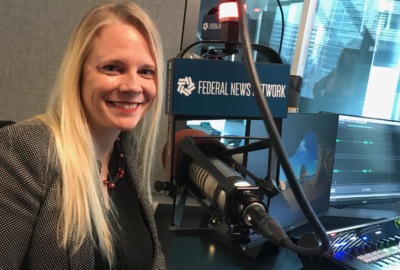

Lisa Pape, deputy chief patient care services officer at the Veterans Health Administration, joined Women of Washington to discuss her career dedicated to helping...
Best listening experience is on Chrome, Firefox or Safari. Subscribe to Women of Washington’s audio interviews on Apple Podcasts or PodcastOne.
From a young age, Lisa Pape knew she would dedicate her life to social work. This may or may not have had something to do with growing up near a Department of Veterans Affairs center in northwest Ohio.
On this week’s episode of Women of Washington, host Gigi Schumm welcomed Pape, deputy chief patient care services officer at the Veterans Health Administration within VA. In her role, she is responsible for social work, care management and chaplain services. Until July 2018, Pape served as acting chief of staff for VHA, paying special attention to veteran homelessness.

Care management is twofold, Pape said. First, the department has a program designed to work directly with veterans and their caregivers. The second is called Transition and Care Management (TCM), and is focused on helping transitioning service members leave the DoD and move into the VA.
Pape said she is also excited about a new program VA is developing to focus on mitigating domestic violence cases. She said she doesn’t know for sure if domestic violence is more common within VA families but she wants everyone to be safe regardless.
“Just educating the general public about intimate partner violence and our veterans can help decrease the issues that come around that,” she said. “So we’re starting that. [We] already have some services at about 60 hospitals and our plan is to roll that out across the system so that everybody gets some kind of screening.”
One issue that is significant among veterans is homelessness. When the VHA started its initiative in 2010, veterans were over-represented in the homeless population for many reasons: Mental health issues, substance abuse and a lack of affordable housing.
Pape and her team were able to decrease that by 49 percent, and by 17 percent between January 2015 and January 2016 alone. For her efforts and dedication, the Office of Personnel Management awarded Pape a Meritorious Executive Presidential Rank Award in 2018.
“It was not just me. It was the dream team in the homeless programs being recognized,” she said. “I was just so honored to be able to serve veterans my entire career and to be recognized for the work that me and my team were able to do.”
Pape started her social work career back home in a town just outside of Cleveland, Ohio. She said in that time of her career, she gained several mentors in her life, primarily those in senior positions.
“There’s so much to learn from somebody who has made their way up the career ladder and done some things. So I always try and see that as a mentor,” she said. “One was my first supervisor … he was the chief of the homeless domiciliary and he was also a social worker. [He] just helped me early in my career — when you’re not as confident and you’re not sure you’re doing the right thing. He was always available to give me good advice and to guide me.”
A few years later when she moved to D.C. to start her federal career she invited him to come along. He did and the tables were turned, she then became his boss. She said he told her to always take the high road, even in times of stress and frustration.

“Sometimes the easy thing is to just let [the veterans] do it on their own, or just giving them a name or referral. But it’s not [the] right thing,” she said. “Sometimes those veterans need us to make that phone call, to make that connection, to help them find whatever it is they need for services.”
Being able to make an actual difference, whether in a hands-on role or behind-the-scenes, is what keeps Pape, and others like her in their public sector positions. While the private sector may in many ways bring in more money or opportunities for entrepreneurship, Pape said the fulfillment she gets from public service is more than enough.
Many women are also attracted to the public sector because of its commitment to diversity. Pape said the government — especially in the healthcare sector — is more acutely aware of women and minorities because these groups represent the clients that they serve.
In the end, it all comes down to doing the right thing for you and for your clients or in her case, for the veterans. Her advice? Don’t be afraid to speak truth to power. It’s okay not to bite your tongue, but make sure you say it professionally, she said.
“I wish someone would have told me not to worry so much about the small stuff, and not try to control it,” Pape said. “I spent a lot of my early career just really worried about some of the little things that would happen that looking back, didn’t really matter. Because it’s really about how good you’re serving the veteran.”
Some are lucky and do find their calling early in their career. Pape was one of them.
She said she always knew she would be a social worker and couldn’t imagine herself in any other role, except maybe working with animals.
Copyright © 2025 Federal News Network. All rights reserved. This website is not intended for users located within the European Economic Area.
Steff Thomas is a digital editor at Federal News Network.
